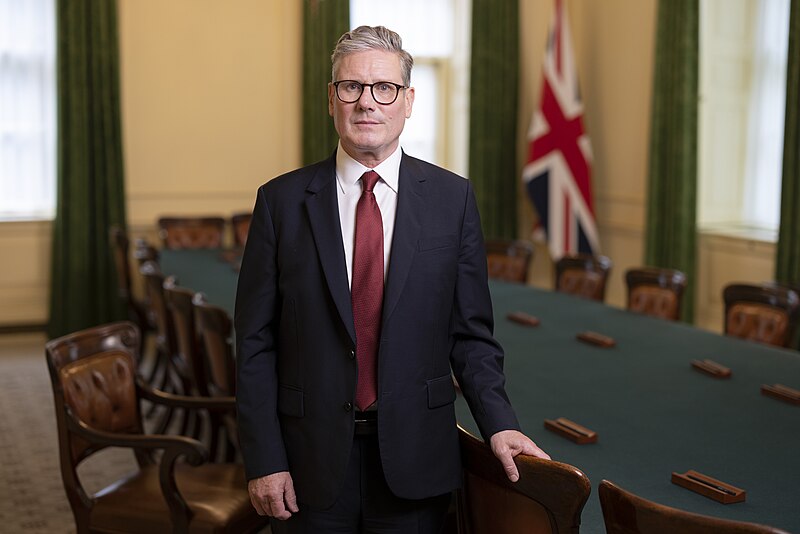
Britain's new Prime Minister, Keir Starmer, vowed on Friday to use his substantial electoral majority to rebuild the nation, aiming to cool the political climate following
years of turmoil.
Addressing the public from outside Number 10 Downing Street, Starmer acknowledged the significant task ahead after his party's overwhelming victory in the parliamentary election, which ended 14 years of often turbulent Conservative rule.
He cautioned that improvements would be gradual, emphasizing the need to restore faith in politics first.
"This lack of trust can only be healed by actions, not words. I know that," he asserted.
"To everyone, whether you voted Labour or not—especially if you did not—I say to you directly: My government will serve you. Politics can be a force for good. We will demonstrate that."
Starmer was met with enthusiastic cheers, taking time before his speech to shake hands and hug aides and supporters along Downing Street, evoking scenes reminiscent of Tony Blair's arrival in government in 1997.
Standing at the lectern, he acknowledged the widespread disillusionment with politics after years of scandal and chaos under the Conservatives, who suffered a historic defeat in Thursday's election.
Starmer stated that the rejection indicated Britain was ready for a fresh start: "Because no matter how fierce the storms of history, one of the great strengths of this nation has always been our ability to navigate toward calmer waters."
Massive Majority
The centre-left Labour Party secured a substantial majority in the 650-seat parliament, leading to Rishi Sunak's resignation on Friday morning. Starmer then met with King Charles to be formally appointed as prime minister.
He pledged to fight daily to rebuild trust, emphasizing that Britain would have a "government unburdened by doctrine," reiterating his campaign promise to prioritize the country over party.
"To quietly defy those who have written our country off. You have given us a clear mandate, and we will use it to deliver change."
The election result has dramatically altered British politics. Labour gained over 410 seats, an increase of 211, while the Conservatives lost 250 seats, including a record number of senior ministers and former Prime Minister Liz Truss.
Sunak's Conservatives endured the worst performance in their history as voters punished them for the cost of living crisis, failing public services, and a series of scandals.
"To the country, I would like to say first and foremost, I am sorry," Sunak said outside Downing Street, adding that he would remain as Conservative leader until a new one was appointed.
"I have given this job my all, but you have sent a clear signal that the government of the United Kingdom must change, and yours is the only judgment that matters. I have heard your anger, your disappointment, and I take responsibility for this loss."
Tough Road Ahead
Despite Starmer's decisive victory, polls suggested there was little enthusiasm for either him or his party. Thanks to Britain's first-past-the-post system and a low turnout, Labour's triumph was achieved with fewer votes than in 2017 and 2019—the latter being its worst result in terms of seats won in 84 years.
The pound, British stocks, and government bonds saw slight rises on Friday, but Starmer faces numerous daunting challenges as he takes office.
Britain's tax burden is projected to reach its highest level since just after World War II, net debt is nearly equivalent to annual economic output, living standards have declined, and public services are under strain, particularly the National Health Service, which has been plagued by strikes.
Some of Labour's more ambitious plans, like its flagship green spending pledges, have already been scaled back. Starmer has promised not to raise taxes for "working people."
He has also committed to ending the Conservative policy of sending asylum seekers to Rwanda. However, with migration a key electoral issue, he will be under pressure to find a solution to stop tens of thousands of people arriving across the Channel from France in small boats.
"I don't promise you it will be easy," Starmer said earlier at a victory rally. "Changing a country is not like flicking a switch. It's hard work. Patient, determined work, and we will have to get moving immediately."
His initial ministerial appointments held no surprises. Rachel Reeves was named Britain's first female finance minister, Angela Rayner was made deputy prime minister, and David Lammy was appointed foreign minister, all retaining the roles they held in opposition.
The election result also showed growth in support for the right-wing Reform party, led by Nigel Farage, mirroring recent gains by far-right parties in Europe. However, unlike in France, where Marine Le Pen's National Rally made historic gains, the British public opted for a centre-left party for change.
Starmer has promised to improve relations with the European Union post-Brexit, though rejoining the EU is not on the table.
He may also have to work with Trump if he wins the upcoming U.S. presidential election. Trump has already congratulated Farage via his social media platform, Truth Social.
While Starmer has pledged domestic change, he remains committed to London's unwavering support for Ukraine in its conflict with Russia. On many foreign policy issues, his stance aligns with Sunak's.
The election victory marks an incredible turnaround for Starmer and Labour, a party that critics and supporters alike said was facing an existential crisis just three years ago after its 2019 defeat. Photo by Simon Dawson / No10 Downing Street, Wikimedia commons.




































